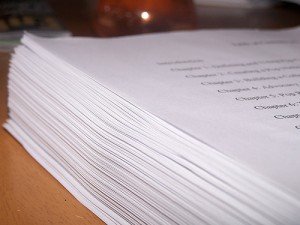On Ghostwriting: Have Pen. Will Write. (For Pay) by Alice H. Anderson
 Today we welcome writer Alice H. Anderson and her tips on ghostwriting. Enjoy!
Today we welcome writer Alice H. Anderson and her tips on ghostwriting. Enjoy!
***
I have never ghosted a book for anyone famous, only people who want to be famous. For one book I ghosted I made my client sign a legal agreement that my name would not be in the book anywhere. Since then I’ve been more careful what I agree to ghost!
One client gave me the opening scene and I took it to a 320-page book from there. (Luckily he loved what I wrote!) He did a fine job of editing and fine-tuning to make it feel more like his own, not mine. Amazingly he changed only a few things here and there.
Usually the client has a vague idea of what he or she wants. Sometimes I’ve received an outline. This is not necessarily a good thing since most books tend to write themselves and what comes out of my fingers might not match what the client wanted. Early in my writing career I had to rewrite huge portions of one book because I let my own idea of the plot dictate what I wrote. My client was not pleased and neither was I.
Sometimes the client gives me an outline and his basic idea for the plot and action. Sometimes I get very little except an idea. I research the topic, the location and anything else that occurs to me. Then I make an outline and work on the opening scene. The rest has always fallen into place. My client and I keep in touch throughout the process and I call or e-mail on a regular basis with progress reports. If my client makes a choice I consider unwise, I say so and explain why. The fact that I’ve written more books than my client usually gives weight to my opinion. If the client insists and I still feel strongly about it, I do what the client wants but I ask him or her to sign a document stating my name will not be connected with the book in any way.
The easiest books to ghostwrite are the autobiographical ones. The client supplies me with clippings, old diaries, articles (if any), photos, and a basic list of what is to be included. The rest comes through interviewing the client. I ask the questions that occur to me because the readers will probably have the same questions.
I tell my clients their books are exactly that: theirs, not mine. I also let them know that if their name is on it, the writing of the book will be a joint effort. I insist on the option of having my name mentioned or not mentioned at all. That goes into my written contract with each client.
Maintaining the client’s voice throughout the book is crucial to his or her satisfaction and to the bottom line: sales.
When people learn you are ghostwriting a book, you’ll get typical questions such as: “Why in the world would you want to do that?” and “Don’t you want some of the glory?” My all-time favorite is: “So what famous people have hired you?” So far no one famous has contracted with me. But I’ve ghosted for some wonderful people who had a great story idea and I helped them achieve their goal of becoming a published author. For me that is reward enough (and getting paid, of course).
In my mind, ghostwriters are in a class by themselves. It’s rumored that even William Shakespeare used a ghostwriter. (No, it wasn’t Lady Macbeth.) I have found ghosting a fun and challenging way to earn a living. The ghostwriter’s mantra is two-fold: It’s not your book. Don’t get too fond of it.
***
ABOUT THE AUTHOR
 Alice H. Anderson is the author of 63 books in 12 genres in 15 years. You can reach her at yourauthor50@gmail.com or www.yourauthor.com.
Alice H. Anderson is the author of 63 books in 12 genres in 15 years. You can reach her at yourauthor50@gmail.com or www.yourauthor.com.






